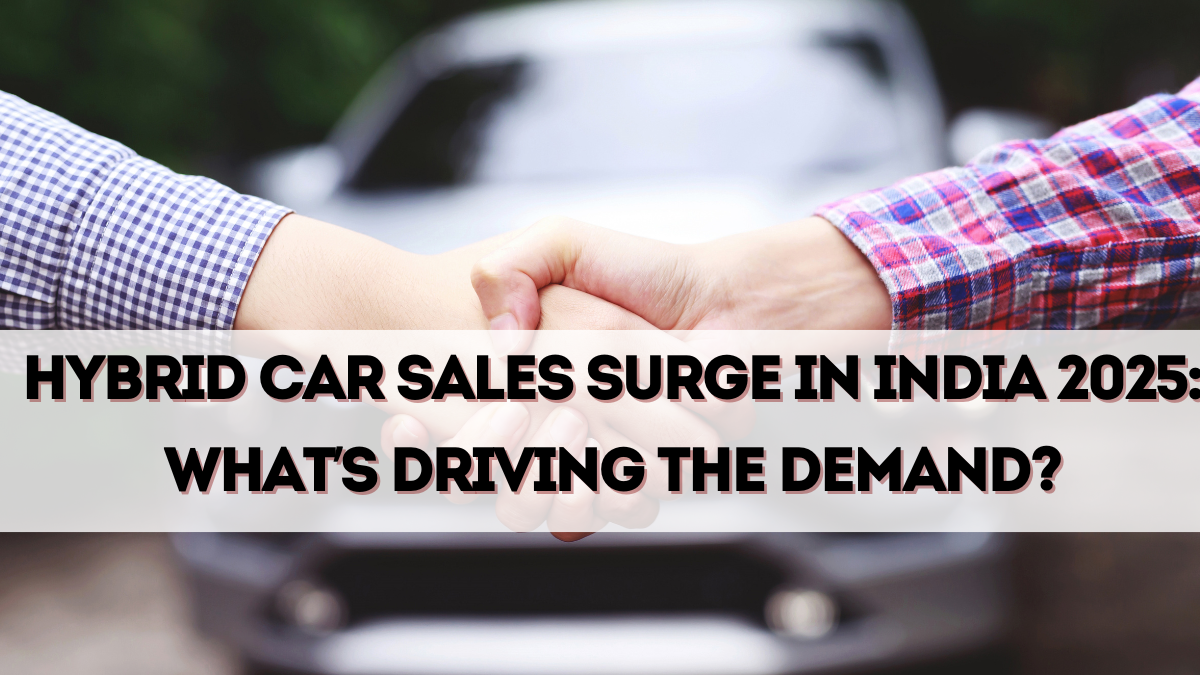India’s automobile market is experiencing a shift in buyer preferences in 2025. While electric vehicles continue to attract attention, it is hybrid cars that are emerging as a strong alternative. Buyers are turning towards hybrids as they balance the benefits of petrol engines with the efficiency of electric motors.
This shift is particularly visible with brands like Toyota and Maruti Suzuki, which are leading the hybrid wave. The surge in hybrid car demand India 2025 is reshaping the market in ways that were not expected just a few years ago.

Why Hybrids Are Becoming Popular
One of the main reasons hybrids are gaining popularity is fuel efficiency. Rising petrol and diesel prices have made customers search for cost-effective solutions. Hybrids offer significantly better mileage compared to conventional cars.
Another key factor is range confidence. EV buyers often worry about limited charging infrastructure. Hybrids remove that anxiety since they can switch to petrol when the battery runs low. This makes them more practical for long drives and rural areas where charging stations are limited.
Toyota and Maruti Leading the Market
Toyota’s Urban Cruiser Hyryder and Innova Hycross are selling strongly. These models offer powerful hybrid technology with long-term durability.
Maruti Suzuki has also joined the trend with the Grand Vitara Hybrid. The company is marketing hybrids as a solution for buyers who are not ready for full EVs but want better efficiency.
Together, Toyota and Maruti account for the largest hybrid sales share in India, and their success is encouraging other manufacturers to expand in this space.
Government Push and Policy Support
Although most incentives are directed at EVs, hybrids are indirectly benefiting. The FAME-3 scheme has created awareness about clean mobility, and hybrids are being seen as a stepping stone.
In addition, several states are offering reduced road taxes for hybrid vehicles. This makes them more affordable at the time of purchase. Buyers see this as an advantage when compared to petrol-only models.
Consumer Mindset in 2025
The modern Indian car buyer is more informed. They are not just looking at the sticker price but also evaluating long-term ownership costs.
Hybrids offer lower running costs, strong resale potential, and fewer charging headaches compared to EVs. For many middle-class families, this is the ideal balance.
Surveys show that 40% of urban buyers in 2025 prefer hybrids over conventional ICE cars. The acceptance rate is rising fastest in metro cities like Delhi, Bengaluru, and Mumbai.
Hybrid vs EV: The Practical Choice
EVs may be the future, but India still struggles with charging infrastructure. Waiting long hours at charging points or facing range limitations discourages some buyers.
Hybrids, on the other hand, use self-charging systems where the battery charges while driving. This technology gives them a clear advantage until India achieves widespread EV adoption.
Many analysts now believe hybrids will play a bridge role in India’s transition to fully electric vehicles.
Fuel Economy and Cost Benefits
Hybrids offer 20-30% better fuel efficiency compared to petrol cars. Over five years, this translates to thousands of rupees saved.
Maintenance is also lower than expected, as modern hybrid engines are designed for durability. Combined with government tax relaxations, hybrids present an economical ownership experience.
Growing Model Options
In 2025, buyers have more hybrid options than ever. Apart from Toyota and Maruti, companies like Honda and Hyundai are preparing new launches.
This variety makes hybrids available in different price ranges. From compact SUVs to premium MPVs, the hybrid segment is expanding quickly.
Industry reports suggest that hybrid car sales have grown 35% year-on-year in the first half of 2025. This is one of the fastest growth rates in the Indian automobile sector.
Challenges for Hybrid Adoption
Despite their popularity, hybrids face some challenges. Prices remain higher than petrol-only cars, and buyers need convincing on the long-term savings.
Another challenge is policy clarity. Some experts argue that too much focus on hybrids might slow EV adoption. The government continues to balance between both technologies.
However, the rising sales figures suggest that hybrids are here to stay for at least the next decade.
The Future of Hybrids in India
Looking ahead, hybrids will play an important role in India’s green mobility journey. They provide a practical middle ground for buyers who are not yet ready for full electrification.
By 2030, EVs are expected to dominate, but in the meantime, hybrids are filling the gap. For 2025, they remain one of the most promising segments of the car industry.
FAQs
Why are hybrid cars popular in India in 2025?
They are popular because they provide better fuel efficiency and remove range anxiety compared to EVs.
Which companies are leading the hybrid market in India?
Toyota and Maruti Suzuki are leading with models like Hyryder, Hycross, and Grand Vitara Hybrid.
Do hybrids qualify for subsidies in India?
Direct subsidies are mostly for EVs, but hybrids benefit from lower taxes in many states.
Are hybrids cheaper to maintain than petrol cars?
Yes, hybrids generally have lower running costs and longer engine durability compared to regular petrol cars.
Will hybrids replace EVs in India?
Hybrids are not a replacement but a transition step. They are expected to remain strong until EV infrastructure expands fully.
Click here to know more.
